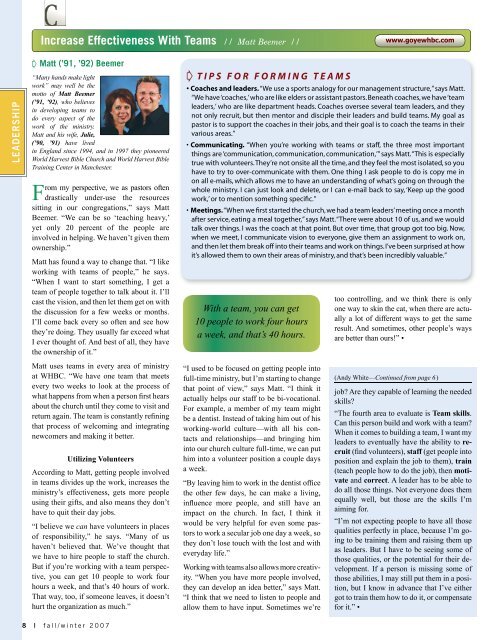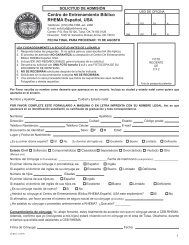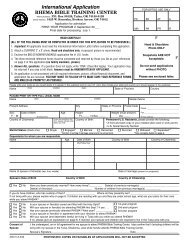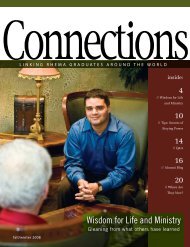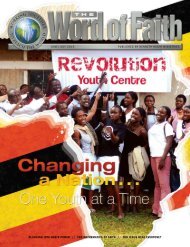Download - Rhema
Download - Rhema
Download - Rhema
- No tags were found...
Create successful ePaper yourself
Turn your PDF publications into a flip-book with our unique Google optimized e-Paper software.
Increase Effectiveness With Teams // Matt Beemer //www.goyewhbc.comLEADERSHIP Matt (’91, ’92) Beemer“Many hands make lightwork” may well be themotto of Matt Beemer(’91, ’92), who believesin developing teams todo every aspect of thework of the ministry.Matt and his wife, Julie,(’90, ’91) have livedin England since 1994, and in 1997 they pioneeredWorld Harvest Bible Church and World Harvest BibleTraining Center in Manchester.From my perspective, we as pastors oftendrastically under-use the resourcessitting in our congregations,” says MattBeemer. “We can be so ‘teaching heavy,’yet only 20 percent of the people areinvolved in helping. We haven’t given themownership.”Matt has found a way to change that. “I likeworking with teams of people,” he says.“When I want to start something, I get ateam of people together to talk about it. I’llcast the vision, and then let them get on withthe discussion for a few weeks or months.I’ll come back every so often and see howthey’re doing. They usually far exceed whatI ever thought of. And best of all, they havethe ownership of it.”Matt uses teams in every area of ministryat WHBC. “We have one team that meetsevery two weeks to look at the process ofwhat happens from when a person first hearsabout the church until they come to visit andreturn again. The team is constantly refiningthat process of welcoming and integratingnewcomers and making it better.Utilizing VolunteersAccording to Matt, getting people involvedin teams divides up the work, increases theministry’s effectiveness, gets more peopleusing their gifts, and also means they don’thave to quit their day jobs.“I believe we can have volunteers in placesof responsibility,” he says. “Many of ushaven’t believed that. We’ve thought thatwe have to hire people to staff the church.But if you’re working with a team perspective,you can get 10 people to work fourhours a week, and that’s 40 hours of work.That way, too, if someone leaves, it doesn’thurt the organization as much.” T I P S F O R F O R M I N G T E A M S• Coaches and leaders. “We use a sports analogy for our management structure,” says Matt.“We have ‘coaches,’ who are like elders or assistant pastors. Beneath coaches, we have ‘teamleaders,’ who are like department heads. Coaches oversee several team leaders, and theynot only recruit, but then mentor and disciple their leaders and build teams. My goal aspastor is to support the coaches in their jobs, and their goal is to coach the teams in theirvarious areas.”• Communicating. “When you’re working with teams or staff, the three most importantthings are ‘communication, communication, communication,’” says Matt. “This is especiallytrue with volunteers. They’re not onsite all the time, and they feel the most isolated, so youhave to try to over-communicate with them. One thing I ask people to do is copy me inon all e-mails, which allows me to have an understanding of what’s going on through thewhole ministry. I can just look and delete, or I can e-mail back to say, ‘Keep up the goodwork,’ or to mention something specific.”• Meetings. “When we first started the church, we had a team leaders’ meeting once a monthafter service, eating a meal together,” says Matt. “There were about 10 of us, and we wouldtalk over things. I was the coach at that point. But over time, that group got too big. Now,when we meet, I communicate vision to everyone, give them an assignment to work on,and then let them break off into their teams and work on things. I’ve been surprised at howit’s allowed them to own their areas of ministry, and that’s been incredibly valuable.”With a team, you can get10 people to work four hoursa week, and that’s 40 hours.“I used to be focused on getting people intofull-time ministry, but I’m starting to changethat point of view,” says Matt. “I think itactually helps our staff to be bi-vocational.For example, a member of my team mightbe a dentist. Instead of taking him out of hisworking-world culture—with all his contactsand relationships—and bringing himinto our church culture full-time, we can puthim into a volunteer position a couple daysa week.“By leaving him to work in the dentist officethe other few days, he can make a living,influence more people, and still have animpact on the church. In fact, I think itwould be very helpful for even some pastorsto work a secular job one day a week, sothey don’t lose touch with the lost and witheveryday life.”Working with teams also allows more creativity.“When you have more people involved,they can develop an idea better,” says Matt.“I think that we need to listen to people andallow them to have input. Sometimes we’retoo controlling, and we think there is onlyone way to skin the cat, when there are actuallya lot of different ways to get the sameresult. And sometimes, other people’s waysare better than ours!” •(Andy White—Continued from page 6 )job? Are they capable of learning the neededskills?“The fourth area to evaluate is Team skills.Can this person build and work with a team?When it comes to building a team, I want myleaders to eventually have the ability to recruit(find volunteers), staff (get people intoposition and explain the job to them), train(teach people how to do the job), then motivateand correct. A leader has to be able todo all those things. Not everyone does themequally well, but those are the skills I’maiming for.“I’m not expecting people to have all thosequalities perfectly in place, because I’m goingto be training them and raising them upas leaders. But I have to be seeing some ofthose qualities, or the potential for their development.If a person is missing some ofthose abilities, I may still put them in a position,but I know in advance that I’ve eithergot to train them how to do it, or compensatefor it.” •8 | f a l l / w i n t e r 2 0 0 7


